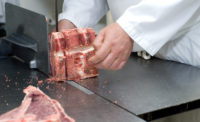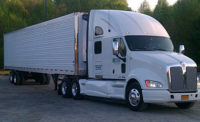Proposed regulations mandated by the Sanitary Food Transportation Act and the Food Safety Modernization Act (FSMA) hold powerful implications for the future of the cold chain industry. The business environment is shifting, and the proposed rule is just one piece of this changing landscape, as the industry experiences an overall increase in regulations, customer-required audits and augmented public pressure from food recalls.
The goal of the proposed rule on the sanitary transportation of human and animal food is to prevent practices that create food safety risks, such as failure to properly refrigerate food, inadequate cleaning of vehicles between loads and failure to properly protect food during transportation. According to FDA, the proposed regulations would help maintain the safety of both human and animal food during transportation by establishing criteria, conditions and practices, training and record keeping for the sanitary transportation of food. The proposed rule addresses the sanitary transportation of both human and animal food traveling via motor or rail vehicle by establishing criteria for the safe transportation of food.
Whether your business is focused on transportation, warehousing or logistics, or if you’re shipping, carrying or receiving food in the United States, you are likely to be impacted by this proposed rule. Meanwhile, best practices from the International Refrigerated Transportation Association (IRTA), a partner of the Global Cold Chain Alliance (GCCA), Alexandria, Va., will focus on carriers.
Shippers
Under the proposed rule, a “shipper” is defined as a person who initiates a shipment of food by motor or rail vehicle (e.g., the food manufacturer who arranges for their food to be shipped).
One of the unique aspects of the third-party logistics industry is the fact that GCCA members very rarely take ownership of the food product that is being stored, handled or transported. The proposed rule does not seem to adequately recognize this situation and how responsibility flows through each step of the supply chain. This is particularly important when determining whom the “shipper” will be for purposes of the rule.
Shipper specific requirements include:
· Specify to the carrier, in writing, all necessary sanitary requirements, including design requirements and cleaning procedures for the carrier’s vehicle and transportation equipment.
· Visually inspect the vehicle or the transportation equipment provided by the carrier for cleanliness and determine that the vehicle or transportation equipment is in appropriate sanitary condition for the transport of the food. Inspection must occur before loading.
· Specify, in writing, to the carrier the temperature conditions necessary during the transportation operation, including the pre-cooling phase, to ensure proper temperature control.
· Verify that each freezer and mechanically refrigerated cold storage compartment or container has been pre-cooled in accordance with shipper requirements before loading food requiring temperature control to prevent microbiological growth.
· Provide hand-washing facility available to vehicle operators who are expected to handle food that is not completely enclosed.
· Load foods that require temperature control for safety in a manner that prevents rapid and prolific growth of human pathogens.
Carriers
A “carrier” is defined as a person who owns, leases or otherwise is ultimately responsible for the use of a motor or rail vehicle to transport food (e.g., the common carrier that physically ships the food).
The proposed requirements on carriers highlight the importance of communication between shippers and carriers. It will be critical for carriers to understand what the regulation requires of shippers and how that will impact the information flowing between shippers and carriers. The IRTA best practices will assist carriers in meeting their obligations under the rule.
Carrier specific requirements include:
· Supply a vehicle and transportation equipment that meets any requirements specified by the shipper and is otherwise appropriate to prevent the food from becoming adulterated.
· Demonstrate to the shipper, and if requested, to the receiver, that the carrier maintained temperature conditions consistent with shipper specifications.
· Meet pre-cooling requirements specified by the shipper.
· In the case of bulk vehicles, provide information to the shipper that identifies the three previous cargoes transported in the vehicle.
· Provide information to the shipper that describes the most recent cleaning of the bulk vehicle (unless otherwise agreed upon between carrier and shipper).
· Specify practices for cleaning, sanitizing, if necessary, and inspecting vehicles and transportation equipment that the carrier provides for use in the transportation of food to maintain the vehicles and the transportation equipment in appropriate sanitary conditions.
· Implement written procedures to comply with the temperature control monitoring requirements.
· Provide and document training to transportation operations personnel in food safety issues that may occur during food transportation, sanitary transportation preventive controls and practices and carrier responsibilities.
Receivers
A “receiver” is defined as a person who receives food after transportation, whether or not they represent the final point of receipt for the food (e.g., distribution center). A receiver is not an individual consumer or a person that receives the food on behalf of a consumer, provided the person is not a party to the transaction and is not in the business of distributing food.
Receiver specific requirements include:
· Provide hand-washing facility available to vehicle operators who are expected to handle food that is not completely enclosed.
· Carry out loading and unloading operations under conditions that will prevent the food from supporting microbial growth.
· In addition to the regulatory requirements specified in the rule, the following practices are strongly encouraged to maintain close communication with shippers and carriers, understand requirements placed by shipper on carrier and share any contractual requirements receiver may have with shipper and carrier.
· Coordinate with receivers and shippers to avoid conflicting requirements/practices.
FDA is currently going through public comments received for the proposed rule on sanitary transportation of food, including those submitted by GCCA. The FDA is scheduled to complete this process and issue a final rule by the court-mandated date of March 2016. In the meantime, the IRTA task force will continue developing a best practices guide to assist the industry with compliance, and GCCA will continue engaging with FDA to communicate the interests and concerns of the cold chain.
IRTA Refrigerated Transportation Best Practices Task Force
It has never been more important to establish best practices in refrigerated transportation and logistics. The industry needs best practices to stay in compliance, but more importantly, to ensure consumer safety.
To address this, the International Refrigerated Transportation Association (IRTA), a core partner of the Global Cold Chain Association (GCCA), Alexandria, Va., created the Refrigerated Transportation Best Practices Task Force, which will establish industry best practices for the transportation and handling of temperature-controlled products.
In collaboration with a broad spectrum of industry associations and private companies, the task force is working on developing a guidance document that establishes best practices for carriers and shippers.






